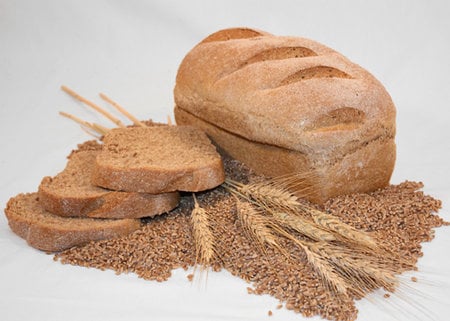In my last post I answered the question “Why do we need carbs from whole grains?”
Here are 3 more common questions on this topic.
1. Aren’t carbohydrates the cause of all weight gain?
No. Carbohydrates are blamed for weight gain because the proportion of carbohydrate in our diet has been increasing over the last 40 years. It is true that the average American diet is made of a larger percent of carbohydrate than it did 40 years ago… but it also should be noted that calorie intake has increased dramatically -- about 24.5% more calories every day according to the US Department of Agriculture Economic Research Service. Physical activity has also significantly decreased. Instead of blaming the excess calories and the reduction of calorie burning physical activity for the weight gain, carbohydrates get the blame.

2. What is the Low Carbohydrate Diet?
There are a wide variety of low carbohydrate diets out there, but in general they all restrict or limit intake of all foods in the carbohydrate category- including fruits, starch vegetables, whole grains and fat free dairy products. That means that intake of all of the body’s preferred energy source, antioxidants, vitamins, minerals and fiber is restricted as well. As a result, there is a decline in the intake of nutrients that are linked to a reduced risk of cancer, GI disorders, heart disease and other chronic diseases.
When you restrict carbs, protein and fat are primarily what make up the diet -- translating into higher intake of fats, saturated fats, and cholesterol which are linked to cardiovascular disease and stroke. As stated in an article in the Journal of the Academy of Nutrition and Dietetics, although it has been shown that low carbohydrate diets do promote greater weight loss initially, after 6 months the weight loss benefits are no more than any other diet. This diet is also hard to maintain long term, and some studies actually show that low carb diets are associated with a greater likelihood of reverting back to being overweight or obese.
3. Are there any negative effects of the Low Carbohydrate Diet?
Because you are restricting a major food group, there are going to be some negative side effects. Besides limiting your intake of specific nutrients, such as folate which is a B vitamin that prevents neural tube defects in infants or cancer fighting antioxidants, you also restrict fiber which can lead to chronic constipation and increase your risk of gastrointestinal cancer and diseases such as diverticulitis. You are also cutting out your body’s preferred source of fuel. What is the problem with this? Allow me to tell you…
This forces your body to breakdown fat to provide you energy. This isn’t such a terrible thing if it isn’t consistent, but long term break down of fat for energy can cause some issues. Excess glucose can be stored as fat, but fat cannot be broken back down to glucose. So instead, fat is broken down and produces something called ketones. Your body can use these for energy but they can produce some negative side effects such as headache, dizziness, weakness, fatigue, constipation, nausea, and dehydration. This also offsets the pH balance in the body and promotes deficiencies in certain vitamins and minerals, can reduce bone density, increase cholesterol, and even lead to kidney stones. In extreme conditions, (often with Type 1 Diabetics that must rely on insulin injections to get glucose to their cells) ketones could actually build up in your blood and ultimately lead to a serious condition called ketoacidosis.
Something else to note is that not all of the cells in the brain can use ketones for energy either. So they must rely on proteins for energy. Protein can be broken down to form glucose that the body can use for energy. This causes either the protein you eat to be used for energy instead of cellular repair, muscle building, or other functions it has in the body or causes the protein from your muscles, blood, and organs to be broken down for energy. This leads to weakness, fatigue and muscle loss. Protein breakdown also produces byproducts that need to be filtered out by the kidney and can worsen kidney function in those with renal disease.
So what conclusions can we draw from all this information?
Any diet that cuts calories will result in weight loss, but what we need to look at is sustainability with that diet. Can you maintain that diet long term and achieve long term results? Will it be at the cost of becoming malnourished? Will you start feeling the negative effects of nutrient deficiency? Weight loss should not be the only goal, but also a long term healthy body weight, overall health status and reduction of risk for chronic disease.
Avoid going to the extreme in anything in your diet. Not eating enough carbohydrates can cause problems just as not consuming enough fat, protein or even water can cause issues. Those same nutrients can also cause problems if consumed in excess—yes even with water.
So be sure to eat a balanced diet with a calorie breakdown of 45-65% from complex carbohydrates, 20-35% from healthy fats, and 10-35% from lean protein. If you really want to shed some pounds or improve your overall health, look at the individual quality of the food you are eating to ensure it is wholesome (e.g. whole grains instead of hyper processed carbs.) Follow a well rounded diet that is full of whole foods and never forget the importance of physical activity.

References:
- Academy of Nutrition and Dietetics Evidence Analysis Library. Adult Weight Management: Managing and losing weight the healthy way. Academy of Nutrition and Dietetics. 2012; 7-8.
- Agriculture Fact Book 2001-2002. Washington, D.C.: U.S. Dept. of Agriculture, 2003. 14-21. Agricultural Fact Book. USDA, Mar. 2003. Web. July 2013.
- "Dietary Reference Intakes Tables and Application." Dietary Reference Intakes Tables and Application. Institute of Medicine, 21 Sept. 2011. Web. 23 July 2013.
- "Dietary Protein and Chronic Kidney Disease." Diet Basics. N.p., n.d. Web. 23 July 2013. <http://www.davita.com/kidney-disease/diet-and-nutrition/diet-basics/dietary-protein-and-chronic-kidney-disease/e/5302>.
- Duyff RL. American Dietetic Association Complete Food and Nutrition Guide. 3rd ed. Hoboken, N.J.: John Wiley & Sons; 2006. 47-48, 113-125. Print.
- Gropper, Sareen Annora Stepnick., Jack L. Smith, and James L. Groff. Advanced Nutrition and Human Metabolism. 4th ed. Belmont (Calif.) [etc.: Wadsworth/Thomson, 2005. Print.
- "Low-carb Diet: Can It Help You Lose Weight?" Mayo Clinic. Mayo Foundation for Medical Education and Research, 11 Oct. 2011. Web. 23 July 2013.
- McKeown N, Troy L, Jacques P, Hoffmann U, O’Donnell C, Fox C. Whole and refined grain intakes are differentially associated with abdominal visceral and subcutaneous adiposity in healthy adult: the Framingham Heart Study. Am J Clin Nutr 2010; 92:1165-1171.
- McKeown N, Yoshida M, Shea M, Jacques P, Lichtenstein A, Rogers G, Booth S, Saltzman E. Whole Grain Intake and Cereal Fiber Are Associated with Lower Abdominal Adiposity in Older Adults. J. Nutr. 2009; 139: 1950-1955.
- Merchang A, Vatanparast H, Barlas S, Dehghan M, Shah S, Koning L, Steck S. Carbohydrate Intake and Overweight and Obesity among Healthy Adults. J Am Diet Assoc. 2009; 109:1165-1172.
- Sizer, Frances Sienkiewicz., and Eleanor Noss. Whitney. Nutrition: Concepts and Controversies. 12th ed. Belmont, CA: Wadsworth Cengage Learning, 2012. 143-48. Print.
Photo credits:
Yoga pose: myyogaonline via photopin cc
Breakfast: Kristof Borkowski via photopin cc



